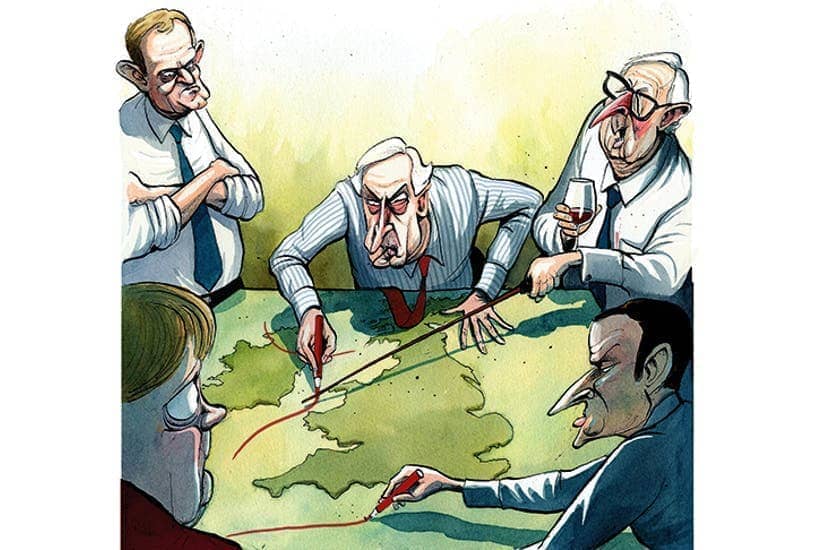With every sausage war or fish fight over the past 18 months, the chances of survival for the Northern Ireland protocol have narrowed. But the fallout from the NI Assembly elections, which saw Sinn Féin become the largest single party, has made it increasingly likely that the UK will take unilateral action to override parts of the Brexit deal.
The protocol has few supporters. Arguably its only redeeming feature was that it allowed Boris Johnson to break the deadlock and conclude the withdrawal agreement. Because a porous land border between the UK and the Republic would have threatened the single market – and a hard border between Northern Ireland and the Republic was unacceptable on political grounds – the Prime Minister compromised. We were left with one constituent part of the UK effectively remaining in both the EU single market and customs union.
Arch remainers will argue that this was the deal agreed upon and regardless of the protocol’s corrosive impact on the Northern Irish economy, we should accept it as a fait accompli. By the same logic, no marriage would ever end in divorce, no contract terminated prematurely. And many are now of the view that the negative impact of the treaty has been overstated. Just look to the new data from the National Institute of Economic and Social Research, they say, which suggests NI’s output ‘has slightly outperformed the UK average’.
It’s now almost impossible to buy Kosher food in Northern Ireland
But the financial burden of the protocol itself has been immense, as a new report endorsed by former Brexit negotiator Lord Frost points out. According to the economist Esmond Birnie, the cost of the endeavour could be £850 million per year. The UK government is spending £360 million establishing and operating the trader support scheme in its first two years, a further £150 million on digital agri-food certification and tens of millions more in related funding to the NI executive.
The business sentiment indicators for April 2022 from the Markit Purchasing Managers Index show firms in NI reporting the biggest increase in operating costs, prices charged and backlogs of work in the UK. NI firms were least optimistic about the year ahead.
Trade diversion has hit staggering levels, with examples of businesses giving up on trying to procure goods from the rest of the UK and instead obtaining them elsewhere at greater cost. In some cases, consumers have been entirely unable to access certain products: it’s now almost impossible to buy Kosher food in Northern Ireland.
These headwinds are not blowing against an economy in robust shape. In 2021, the private sector only accounted for 73 per cent of jobs in NI, compared to 83 per cent of jobs in Britain as a whole. It has received financial support from the UK government amounting to 20 per cent of the region’s GDP – a higher fiscal transfer than the other poorest areas of the UK. Productivity is among the lowest, at 14 per cent below the UK average.
And there has been little evidence so far to indicate that the benefits from continued participation in the single market outweigh the costs – despite the EU’s assertions to the contrary. Further, while the EU acknowledges that the protocol is causing hardship and cost, it seems that the enforcement of the treaty has been applied disproportionately compared with the EU’s efforts to enforce its regulatory and customs regime elsewhere across the bloc. Checks on British goods entering Northern Irish ports account for about 20 per cent of all checks at the EU’s borders, despite the fact that NI’s population comprises just 0.5 per cent of the EU’s total.
The protocol clearly needs reform – preferably along the lines set out in Lord Frost’s command paper. He suggests that the UK should continue helping to protect the EU single market by applying EU customs rules to goods going via Northern Ireland into the single market. In return, goods would be able to flow much more easily into, and within, Northern Ireland.
Instead, the EU is seeking for implementation to be dialled up, including the end of the grace periods that have mitigated its effects so far. This could dramatically worsen NI’s economic position.
It might be Panglossian to expect that the Assembly elections will force both parties back to the negotiating table. More likely is that the UK government presses ahead with unilateral action to remedy the ill effects of the protocol. Doing so will undoubtedly elicit cries that our Foreign Secretary is ‘tearing up’ a key Brexit agreement. But looking at the economic and social costs involved, we may soon discover that unilateral action was not only necessary but justified.






Comments